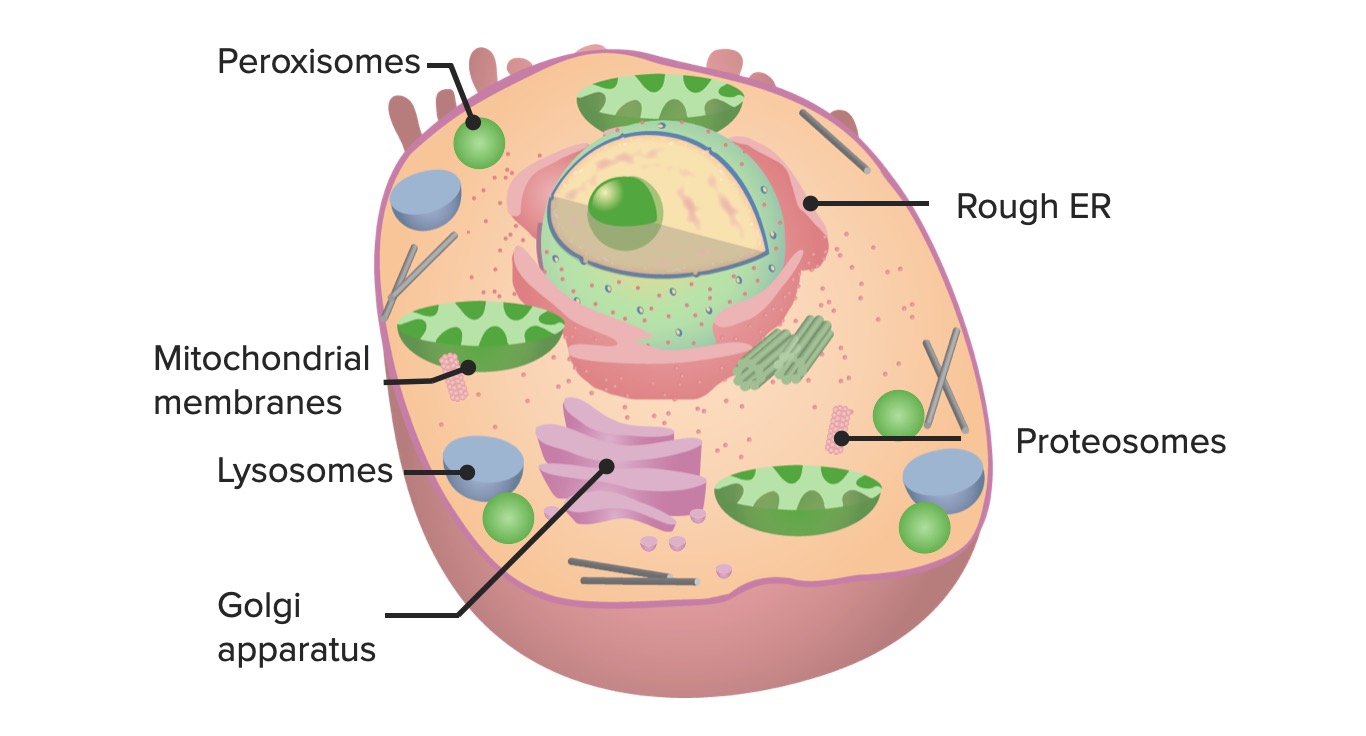Playlist
Show Playlist
Hide Playlist
Lysosomes
-
Slides 06 CellularStructure CellBiology.pdf
-
Reference List Molecular and Cell Biology.pdf
-
Download Lecture Overview
00:00 So the Golgi apparatus also produces some specialized types of vesicles. We call them lysosomes. 00:07 There are many different kinds of lysosomes. 00:10 In this case, we will discuss ones that are in charge of dealing with trash and recycling in the cell. 00:17 There are definitely organelles that become old and need to be broken down and degraded. 00:22 What happens to those? This is the lysosomes comes in. It's full of enzymes that are good at breaking things down. 00:29 Those enzymes are proteins and so they would probably initially have been made at the endoplasmic reticulum and shipped through the shipping center and come out the other side packaged as lysosomes and labelled and ready to do their job. 00:42 What they will do is bind with a dead or decaying organelle and release their enzymes into that cell and break down the components. 00:54 When it's done with that break down process, it will take the vesicle that's a combined dead organelle with the lysosome and dump it out at the cell surface so that those metabolites can make their way out in the blood and through the excretory systems. 01:12 The other use of lysosomes or lysosome like structures is in the assistance of cellular eating, so the opposite process. 01:22 When a cell gets nutrients into it, how does it break them down? Well that's where lysosomes come into play again. 01:29 So we have a food vacuole, that's the cell has taken in a nice chunk of food, and the lysosome will bind with that food, help the cell digest that food, and then it will be released inside the cell so that those nutrients or components that the cell needs can be utilized within that cell. 01:49 So again, we had this whole endomembrane system, where proteins are manufactured at the endoplasmic reticulum. 01:58 If they're to go, they bind to the endoplasmic reticulum, drop the proteins off in there. 02:04 You ship them from endoplasmic reticulum to the shipping center, and then the shipping center will send them out in the appropriate vehicle to either exit the cell or help in digestion in the case of lysosomes. 02:19 Now there are some problems when lysosomes don't work out quite well, like Tay-Sachs disease. 02:24 And you can imagine what happens there. What if lysosomes are not working well? What do you think could happen? The cell is going to fill up with trash and recycling and that's no good. 02:36 So individuals with Tay-Sachs disease end up having very toxic environment inside their cells very rapidly.
About the Lecture
The lecture Lysosomes by Georgina Cornwall, PhD is from the course Cellular Structure.
Included Quiz Questions
What is the function of lysosomes in a eukaryotic cell?
- Trash disposal, recycling, and cellular eating
- Storage
- DNA storage
- Cellular multiplication
- Protein synthesis
Customer reviews
3,3 of 5 stars
| 5 Stars |
|
2 |
| 4 Stars |
|
0 |
| 3 Stars |
|
0 |
| 2 Stars |
|
1 |
| 1 Star |
|
1 |
Amazing lecture, Dr. Georgina lessons are by far the best I've had in citology. Very clear and straight forward, perfect for the Mcat. Thank you!
The presentation is simple, short and concise preparing students for more detailed content. I believe that this is an efficient approach toward a broader base of an audience. Thank you!
This is not a USMLE 1 focused topic, an important material for the step, it's so superficial either the question that is a first order question. Need to going deep in the topics, we're not an undergraduate students.
First of all I would like to say that I really appreciate all of the effort by the professors and Lecturio to do great lectures, however, I would like to say, as well, that you need to focus on the exam format (In this case - USMLE Step 1). For example, in this lecture it was asked: "Which of the following is NOT a lysosome related disorder?" that is pretty good, because it has a clinical context with the subject, however this " lysosome related disorder" have never been taught by Professor Cornwall.




